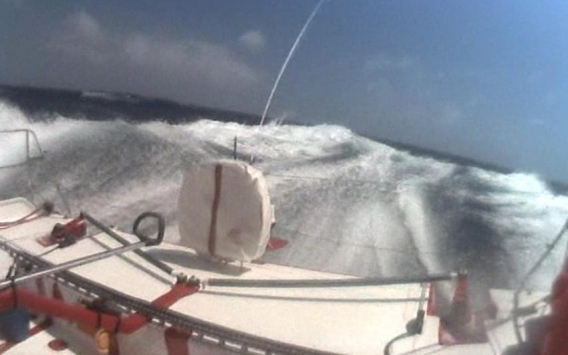As the four boats in the Portimão Global Ocean Race approach the finish line off the Brazilian island of Ilhabela, the forecast is looking increasingly light with projected ETAs stretching further into next week. In the 0920 GMT position poll this morning (28/03), Boris Herrmann and Felix Oehme leading the fleet on Beluga Racer with 611 miles to the finish line, have remained on starboard tack since shortly after midday yesterday and currently have around 11-15 knots of NNE breeze, staying 70 miles ahead of Felipe Cubillos and José Muñoz on Desafio Cabo de Hornos as both Class 40s continue towards the South American coast.
Holding third place in the double-handed fleet, Jeremy Salvesen and David Thomson flipped over onto starboard at around midnight GMT, gaining some height before resuming port tack at 0620 GMT today: currently 168 miles behind the double-handed leader, Team Mowgli have dropped 31 miles to the leader in the past 24 hours as they remain trapped in the southerly-flowing Brazil Current and now trail Beluga Racer by 168 miles and second place Desafio Cabo de Hornos by 98 miles. Meanwhile, the fleet’s solo sailor Michel Kleinjans tacked onto starboard at 0920 GMT this morning and is in a powerful position on Roaring Forty, 48 miles behind Team Mowgli, and may have the best speeds in the fleet later today.
For Boris Herrmann and Felix Oehme on Beluga Racer the prospect of extended time at sea is unsettling so close to the finish. “The more often we look at the miles to go, the longer it feels,” admitted Herrmann this morning. “Over the past weeks at sea where we did not care about distance to finish because it was endless anyway – that feeling was actually easier to cope with,” continues the German skipper. “I’m really glad that we have a serious, tight race going on, but it’s pulling on the nerves more and more every day we get closer to the finish.”
With a new ETA of Wednesday April 1st, the German team are beginning to count the miles down after 35 days at sea: “There’s still four or five days to go if we keep 6 knots VMG,” Herrmann calculates. “Especially as the finish looks really calm from the forecast right now. We have one can of beer left; we promised it to ourselves once we get under 500 miles to finish, hopefully on Sunday.” With the Distance To Finish data ticking down very slowly, the beat towards the finish line is a South Atlantic time warp for the German duo: “The sea is calm and flat like a lake with a small, dinghy-size chop,” says Herrmann. “Beluga digs her freeboard into the water, heels constantly over under the pressure of full sails close to the wind and smoothly slices into the small waves,” he continues. “It’s deeply pleasing how the boat glides powerfully into the glittering sun, which is shining straight from the north, but everything is so constant and unchanging here right now that time feels like a bungee.” Weather models suggest that the breeze should turn slightly northerly at around 1500 GMT today giving Beluga Racer and Desafio Cabo de Hornos the chance to tack away from the coast and climb to the north-east. This change cannot come too quickly for Herrmann and Oehme: “Please send us a wind shift to the left for half a day and then to the right,” pleads the German skipper.
On Desafio Cabo de Hornos, technical difficulties on board the Chilean Class 40 will certainly make the remaining distance to the finish line doubly demanding. “Ever since we left Wellington, the second alternator – whose function is to charge the batteries when we run our 20 HP engine – hasn’t worked,” explains Cubillos. “Therefore, our fuel consumption has been very over budget and we’re already running on fumes.” With limited power supply, the remaining diesel must be rationed strictly. “This means that we are going to have to extinguish all the electronics on the boat in next the 24 hours and we won’t be able to use the automatic pilot.” Running with no masthead instrument relays; limited communications capability and a drastic cutback in weather downloads, Cubillos and Muñoz will be stepping back 50 years in technological terms and will have to rely upon experience, instinct and skill. There is, however, one vital necessity that will require diesel power, confirms the Chilean skipper. “The little fuel that we have left, we will save for running the watermaker for the remaining three or four days at sea.
”
